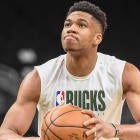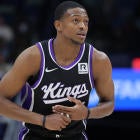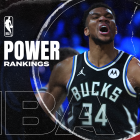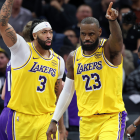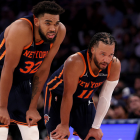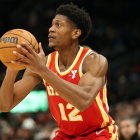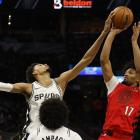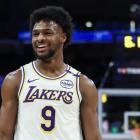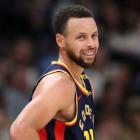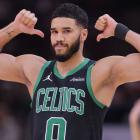This was supposed to be Giannis Antetokounmpo's moment. In a normal world, he would be bulldozing through defenders in the second round of the playoffs, likely en route to the conference finals, where he and the Milwaukee Bucks would have a chance to prove they've learned from last time.
Antetokounmpo will all but certainly win his second straight Most Valuable Player Award, and he has a shot at Defensive Player of the Year. If the 2019-20 regular season is over, his was an all-timer: 29.6 points, 13.7 rebounds, 5.8 assists, a block and a steal in 30.9 minutes. He led the whole league in usage rate, and the Bucks had a plus-16.1 net rating with him on the court, almost identical to the Golden State Warriors' mark with Stephen Curry on the floor in 2014-15, the year Curry won his first title.
If not for the worst global health crisis since the 1918 Spanish Flu, the 25-year-old Antetokounmpo might be on his way to cementing his status at the top of the mountain the same way Curry did five years ago. He and his team, however, were supposed to be challenged now in a way that they weren't in the regular season, by swarming defenses designed to make him make decisions under duress.
If there is some kind of postseason, what does Antetokounmpo need to do to give Milwaukee more room for error than it had against the Toronto Raptors last May? How will his game evolve in the next few years, and how much of that is dependent on his jump shot? CBS Sports' James Herbert, Brad Botkin and Colin Ward-Henninger discuss:
James Herbert: I applaud Antetokounmpo for attempting to diversify his offensive game. His true shooting percentage dropped from 64.4 percent to 60.8 percent this season because he has shot more 3s and, crucially, more in-between shots. Player development is to some degree about investing in failure, and some 1-for-6 nights from behind the arc are a small price to pay for building Antetokounmpo's confidence.
Possessions matter so much more in the playoffs, though, as every coach and player will tell you. If I were coaching against the Bucks, seeing Antetokounmpo make some turnaround jumpers would be scary, but it wouldn't change my game plan: Show him a crowd when he drives, never let him get going in transition and make him take contested jumpers (or even lightly contested 3s) as much as possible.
Antetokounmpo himself knows he still has room to grow. "I can get a lot better," he told Sports Illustrated's Steve Rushin recently. "I can be smarter. I can be sharper. I can make better passes. I can make [a higher percentage of] shots -- 3-point shots, 2-point shots. I can be better. That's the mindset that I have. I still gotta improve."
Going forward, what are you looking for from Giannis on offense? Do you agree with what he said at the end of last season about becoming a midrange master or would you rather he had a Harden-like shot chart? Are there specific moves you wish he'd work on or do you think his next step is more about managing the game like LeBron? Should we all just shut up about his "flaws" and concentrate on how special he already is?
Brad Botkin: Both James and Colin are well aware of my affinity for shooting. Perhaps it's too simplistic, through one lens, to whittle down great players like Giannis or Ben Simmons to the one thing they don't do well -- or in Simmons' case the one thing he doesn't do at all. But through another lens, that one thing is the fulcrum on which the entire league swings.
So, yes, Giannis needs to continue to develop as a shooter. I love what James said about development being an investment in failure. That is so true. Giannis, for example, is taking almost 10 percent fewer shots at the rim this season that he did in 2018-19, and he has, for the most part, replaced those shots with an almost 50-percent uptick in 3-point attempts.
The decision to expand his shot chart is not based on success. Giannis is still shooting 73 percent at the rim, an elite number, but he is forgoing statistically significant portions of that known quantity to shoot 31 percent from 3, per Cleaning the Glass.
Good for him. Because if Giannis can get that 3-point number north of 35 percent, which won't happen overnight, that's when coaches and defenders will actually have to consider adjusting their approach to covering him.
Until then, any 3-pointer Giannis makes is, in a sense, a win for the defense for the simple fact that he took it, and consequently, it doesn't have the mutating effect that truly impactful shooting has where the threat of a shot becomes as important as the shot itself.
This is where the midrange comes in. As the article James referenced talks about, Giannis is focused on adding that shot, consistently and reliably, to his arsenal, and I couldn't agree more with his logic. Any player who relies on getting to the rim too much becomes a head-down, bull in a China shop driver at some point. In the playoffs, a go-to scorer must have a release valve, and Giannis' 3s are just not dependable enough.
His midrange shot can -- and needs to be -- that option.
But the important thing to me is the type of midrange shot. We saw him trying to bang with LeBron James in the post earlier this year and hit contested turnaround shots and fadeaways. Those are too tough for someone of his shooting ability to rely on, consistently and in high-leverage playoff possessions, at this point in his development.
Catching at the elbow and facing up for a 12-to-15-footer; one dribble into the space he's being conceded as a top-of-key ball-handler for a pull-up 12 footer; these are the shots that have him rising up just short of the wall being formed in front of him with a clean look absent all the contact, in the soft spots, because up to a certain point in the paint defenders approach him from a position of retreat. Bam Adebayo is starting down this 12-to-15-foot path. Simmons needs to get there. Lonzo Ball would unlock a huge part of his game by mastering this short midrange.
Giannis is right: Kawhi and K.D. can carry championship teams in the playoffs on the back of that shot. But Giannis is never going to be the natural shooter Durant is, or likely the shooter Kawhi has become. Russell Westbrook, to me, is the most apt, and reasonable, standard for comparison.
Like Westbrook, Giannis plays downhill with extreme force and athleticism. But you can't always get to the rim. That short-midrange pull-up is a deadly weapon for Westbrook when he has it going. When he was in his best years in OKC, he was around 40 percent on those 10-14 footers, with volume.
But it was more than numbers. It was a shot Westbrook knew he could get. A comfort zone. Shot selection is another element of this conversation, but what shots does Giannis have in his bag, other than getting to the rim, that he is going to be comfortable leaning on? The answer is none.
So call it simplistic. Call it a cop-out to stubbornly focus on the lowest-hanging fruit on Giannis' developmental tree. But the truth is Giannis needs to become a better shooter, and then from there be able locate the right shots from the right spots and be able to go back to that well on his terms.
Beyond that, we can talk about Giannis' ball-handling and passing, both of which still have room for meaningful growth.
Colin Ward-Henninger: When we watch Giannis' obvious limitations, the easy thing to do is say he needs to develop his 3-point and midrange game, which of course he does. But that could take years, with no guarantee that he'll ever approach significant proficiency in those areas. A more readily fixable area of his game comes not from the outside, but from the inside.
Giannis' scoring numbers around the rim, whether gaining a head of steam and bulldozing his way into and around defenders or using his strength and length in the post, are impeccable. Nobody since Shaquille O'Neal has been more of a force inside the paint. The issue arise when Antetokounmpo is forced to pass out of those situations.
Giannis is in the 90th percentile in post-up scoring this season, averaging 1.197 points per possession, according to Synergy Sports. When you include passes, however, that number drops to 0.975 points per possession, which is in the 53rd percentile. This is picking very fine nits in the game of a likely two-time MVP, but if we're talking about him ascending to all-time great status and winning titles, passing out of the post and out of double teams has to improve.
Looking through video, it's not that Antetokoumpo makes the wrong passes -- it's more that those passes are sometimes a half-second too late, slightly too weak or just off target. They're small mistakes, but can mean the difference between a made 3-pointer and a missed opportunity. Here's a play that encompasses all three issues:
Contrast Giannis' numbers to those of LeBron, who has become an excellent post-up player over the course of his career. LeBron averages 1.136 points per possession as a post-up scorer this season, but that number goes up to 1.163, the 93rd percentile, when you include passes. It's rare to see James make the wrong read or make an off-target pass when facing pressure. That's the area where Antetokounmpo can most readily improve, especially given the shooters he has surrounding him at all times in Mike Budenholzer's offense.
One common criticism of Giannis is that he doesn't have "go-to" moves offensively. When the game slows down in the playoffs and transition is limited, how is he going to get his team a bucket? Posting up can be the answer, but he'll have to get better at executing the right plays when the defense commits to him.
Herbert: On that note, here's a thought exercise: What does Antetokounmpo have to do in order to become a more dominant FIBA player? He felt like a prisoner in last year's World Cup, and the coach of the Brazilian national team said he'd known how to stop the reigning MVP since watching the conference finals.
The NBA is a different game, but in the playoffs it gets a bit more FIBA-like. The spacing isn't quite as clean, and star playmakers need to be able to make plays under less-than-ideal circumstances. Being able to score from all three levels would make him impossible to defend, obviously, but I see shooting as more of a long-term project here. Passing out of the post fits into what I see as Antetokounmpo's short-term challenge: Becoming more resistant to double-teams.
To his credit, Antetokounmpo has improved as a playmaker, even since those conference finals. This season he increased his usage dramatically, lowered his turnover rate and made passes he wouldn't have seen in prior years. (And, in fairness, it's not as the Bucks' offensive issues against the Raptors were all on him. Had his teammates shot a tiny bit better, they might have won the title, and even with them missing open looks they were outscored by a total of six points over six games.) He is not, however, on the same level as LeBron -- or, say, Luka Doncic -- in terms of breaking down defenses with passing.
Antetokounmpo is a willing passer with point guard experience who understands that his job is to make the right play, not force shots over multiple defenders. I am encouraged enough by the way that he reads the game to say that his next step is to become a true maestro, to the point where he can outfox the best defensive teams in the league under playoff scrutiny. Anything that makes him less predictable -- more counter moves, a tighter handle, etc. -- would help in this regard, and maybe eventually he will have no obvious offensive weaknesses. Until then, it is about being mentally prepared for what's coming and limiting his mistakes.
Ward-Henninger: The FIBA question is interesting because it gets at the heart of why so many people wonder if Giannis will ever lead the Bucks to an NBA title. Greece had the third-best odds to win last summer's FIBA World Cup -- behind the U.S. and Serbia, and ahead of eventual champion Spain, according to some sportsbooks. That's solely because of Giannis' overwhelming talent. Greece's disappointing showing, and Giannis' shockingly subpar performance, lends credence to the viewpoint that he's not ready to carry a team to ultimate success.
Just as so many fans had doubts about Curry ever having playoff success because he was a "jump shooter," which now sounds ridiculous, some look at Giannis' offensive package and think it will simply never translate to winning at the highest level. We've watched James drag teams to the Finals with teammates like Boobie Gibson and Ante Zizic, so to see Giannis fail to lead Greece to FIBA success, on the heels of the Bucks being ousted by the Raptors in embarrassing fashion last postseason, at least suggests that he's more of a product of system and situation than LeBron or, in the past, Michael Jordan. You put either of those guys on any team in the NBA, or any national squad, and they're an immediate title contender. With Giannis, we're not quite sure yet.
Is that fair to Giannis, who was handcuffed in FIBA by a stubborn coach and a so-so supporting cast? Probably not. But these are the questions that are going to linger about Antetokounmpo until he can bring the Bucks a title. If he doesn't, even if he chooses to join another team in free agency and wins a championship down the road, he'll never achieve the status that his talent dictates.
Botkin: What Colin says about Curry having to prove a "jump shooter" can lead a team to a title is interesting, and important, because Curry is not just a jump shooter. That's the point. Basketball is a game of counters. Curry, for example, has always been a world-class 3-point shooter, so the defensive counter is to close his space, press up on him. If Curry wasn't able to develop his own counter, his evolution, and by extension the Warriors' ascension, would've stopped there.
But he did develop a counter, becoming an elite penetrator and finisher. At that point, the only defensive counter left was to try to take the ball out of his hands entirely, at which point Curry evolved into a master at passing out of traps and double teams and doubled down on his elite off-ball movement.
This is why, when LeBron was asked in 2015 how you slow Curry down, he said: "The same way you slow me down. You can't."
Indeed, this is what separates the best of the best. Counters. LeBron, Curry, Kawhi, Kevin Durant, James Harden, the very best offensive players in the world leave you with no outs. With Giannis, you still have a couple outs.
That's what everything we're discussing is about. The way he was neutralized in the FIBA tournament. The frustration he encountered against the Raptors. Defenses countered what he's great at, and none of us are entirely confident in his ability to consistently counter back.
At least not yet.
You talked about the passing, and I agree, Giannis has made appreciable strides as a drive-and-kick distributor and overall floor general. He can stand at the top of an offense, survey, and fire passes to shooters before the defense can react. Post passing out of doubles is an anticipatory art. Giannis is getting better.
Where I'd really like to see him improve is as a space creator with his handle. He's not a pure enough shooter to just catch on the elbow, face up and rise with a hand in his face. His most reliable midrange shots are going to come off of dribble creation -- turning middle out of a post double, attacking downhill into a pull-up -- and too often he's just putting his shoulder down trying to get to the rim and simply shooting, often with compromised balance, as a Plan B when that path is cut off.
Can he maneuver with his handle to actually seek certain spots and generate the space he needs to get there? His game still lacks some superstar subtleties, like the way Kawhi has perfected getting his hip into a defender and creating space with his last step as he rises into what then becomes an effortless jumper. That's a feel and a control that I'm not sure Giannis has yet, a softness perfectly blended with sheer power and force. Giannis is still more of a highlight player, a full-speed Eurostep-and-dunk guy, than he is a coach's example of precision and detailed execution.
All of this is said with the understanding that Giannis is a great player, and with players that are great, falling short of perfection actually becomes a criticism. The truth is, if Giannis was a great shooter with a super tight handle and LeBron-like vision, he'd be a perfect player.
But you don't have to be a perfect player to be an MVP and the best player on a title team. Going back to Curry, he's not perfect. He needs defensive help and, at 6-foot-3 without elite athleticism, he can't generate any shot he wants any time he wants, at least not without working a lot harder than a guy like, say, Durant, who can just turn and shoot over smaller defenders. So the Warriors built their roster accordingly, and Steve Kerr implemented a system that didn't rely so much on Curry to create individually, and they won a title in 2015 with Curry as the undisputed, and imperfect, best player.
The Bucks are doing the same thing. There is no doubt that Giannis, even if he doesn't make one more ounce of improvement, can lead a team to a championship. He's a superstar. But he's what I tend to think of as a circumstantial superstar. If the personnel around him is appropriately tailored, if the pace and dynamics of a game and/or series are fast and full-court, he's unstoppable.
But when those circumstances change, can Giannis counter?
That is still a question, and this year was supposed to get us closer to an answer.









